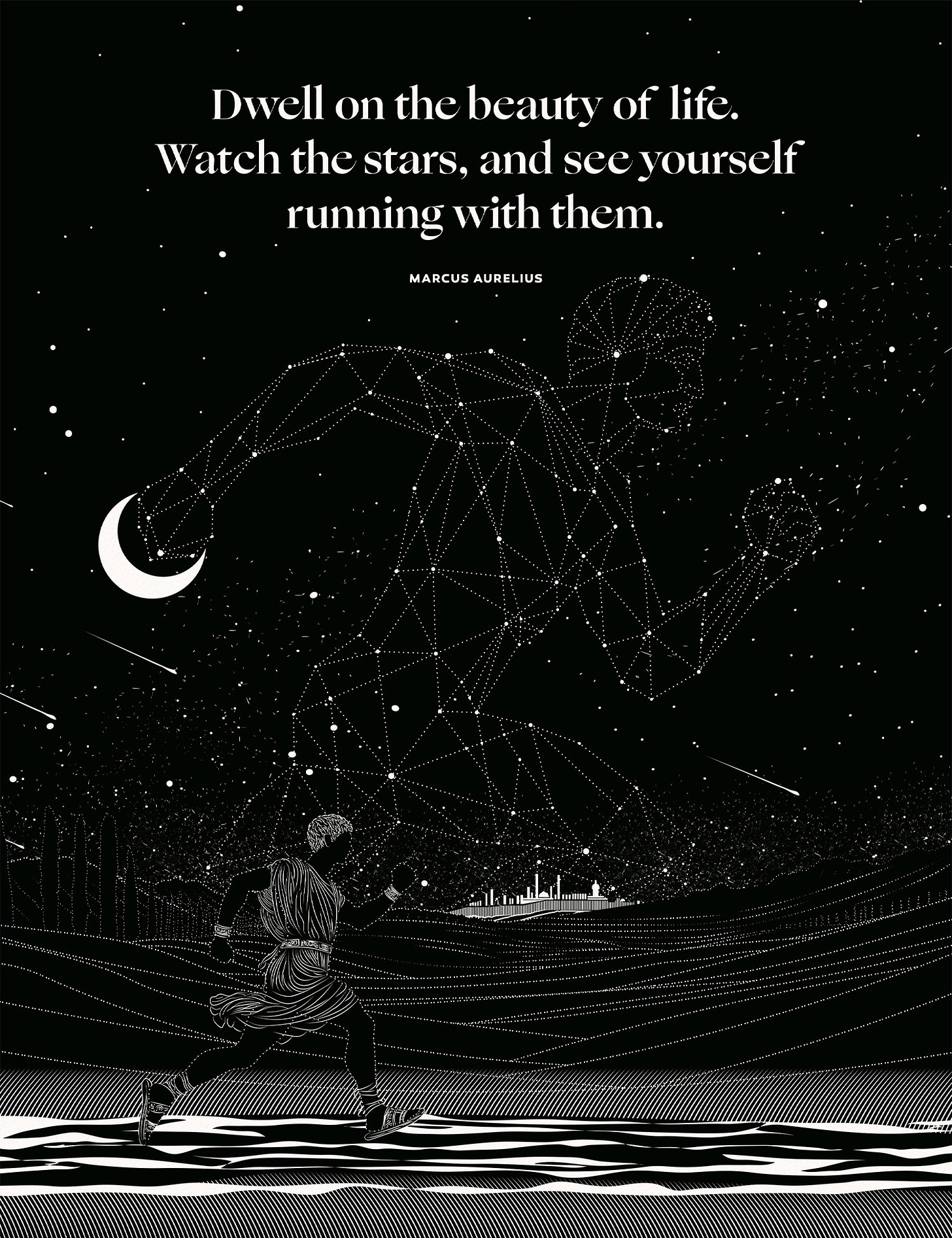
Marcus Aurelius on The Need For Something Bigger

“Dwell on the beauty of life. Watch the stars, and see yourself running with them.” - Marcus Aurelius, The Meditations, 7.47
Above all else, working on Meditations has brought one fact into sharp focus for me: modern civilization has us crazy spoiled. We have it so made that we can no longer even see how good we have it: indoor plumbing, electricity, abundant food, abundant clothing, abundant goods, abundant energy, public services like the police, fire department, hospitals, fellow citizens who obey the law 99.9% of the time, and more almost-free entertainment than we will ever ever watch. We also have the internet, which I’m not sure belongs in the above list, but I’ll write it down with an asterisk.
And yet, we are more anxious, depressed and alienated than ever in history. I promise this is not a criticism (“Buck up, kid, or I’ll give you something to cry about!”). Nor is it meant to imply that we all need life to be harder again like the “good old days.” I am open to the idea that things to worry about expand with our mental space to worry about them, like a family that gets a second fridge and instantly fills it with new necessities. But reading Aurelius, I have a sneaking suspicion that the contrast between modern society’s relative affluence and its unhappiness comes down to something more fundamental: belief and purpose.
Aurelius carefully lays out this choice in book 6 of Meditations: “The universe is either a chaos, a whirl of confusion, or else governed by order, providence, and regulated action. If then it is the former, why do I desire to tarry in a fortuitous combination of things? And why am I disturbed, for the dispersion of my elements into earth will happen whatever I do? But if the other supposition is true, I venerate, and I am firm, and I trust in that which governs.”
In other words, either there is no meaning or there is. If there is no meaning or purpose, you should rejoice that you are here by some miraculous accident. If there is purpose, then you should venerate that which governs and gives you purpose. I’ll add to his observation, that statistically speaking if you want to live a happy and fulfilling life, you are way better off choosing to believe in something (anything!) rather than succumbing to nihilism. Religious people are way happier on average, and as we all learned from The Big Lebowski, nihilism doesn’t end well.
Which brings me to the quotation in the above illustration, which reminded me of the story of Philippides, the runner at the battle of Marathon, from whom the origins of the modern-day marathon spring. Legend has it that Philippides served as a runner delivering vital messages for the Athenians while they fended off the Persians. He ran over 150 miles to and from Sparta, then ran an additional 25 miles to Athens to report their victory, at which point he collapsed and died from exhaustion. Think about running long and hard enough to put yourself in that kind of distress, and finding the will to keep going. Nihilism just ain’t gonna get you there, pal. You need something to believe in.
What gods were looking down on him as he ran? When he looked up and saw the stars over his head, what did those gods tell him? What did it do to him to know they were watching, judging his worthiness? What strength and encouragement did they whisper in his ear? And what values did, in his mind, they instill in him and his children? How did those values run like a vein of gold right through everything that mattered to him - his family, his friends, his country, his culture?
Now as a good, rational and modern dude, I do not believe in a pantheon of anthropomorphic gods judging me from the top of a mountain. I do not believe in the power of gorgons, titans or magic apples. But I do believe in the power of belief. I do believe in the power of a common purpose and a myth that brings us together. And I do hope that we can find that again, in a real way that casts a very wide net and hugs humanity in toward each other and toward a commons sense of purpose and conviction. I believe that life is only worth living if you believe that what you do matters, that it becomes a part of the fabric of the universe in some small but important way.
I could go from here to Whitman “that you may contribute a verse,” then temper it with the observation that plenty of people have beliefs that are not-very-good and go to Yeats’ “the best lack all conviction while the worst are full of passionate intensity,” but that’s a story for another day. If we are ever going to transcend belief-system tribal warfare, we will need something bigger than our tribes. And to that conversation, it seems to me Aurelius can definitely contribute a verse.
SHOP UPDATE
The last day to order the Winter Mystery Gift Pack is tomorrow, January 26th.

